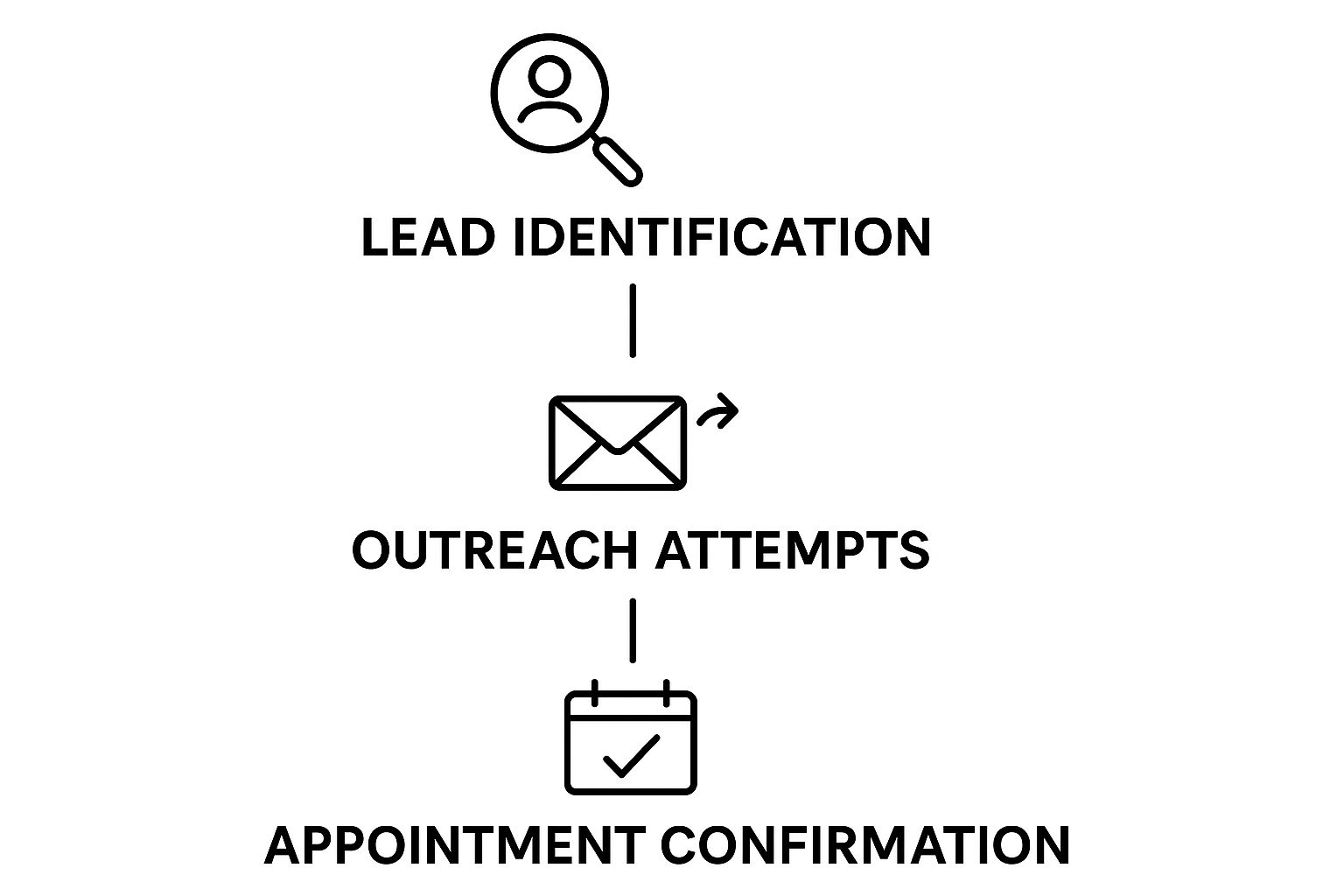What Is an Appointment Setter & Why Are They Key to Sales?
- Prince Yadav
- Jul 8, 2025
- 10 min read
Let's be honest, in sales, not all leads are created equal. An appointment setter is the person who sorts the wheat from the chaff. They're the specialists who take a cold list of potential leads and turn it into a calendar full of warm, qualified prospects who are genuinely ready to talk to a sales executive.
The Role of an Appointment Setter in Modern Sales
Think of an appointment setter as the air traffic controller for your sales team. They aren't flying the plane or closing the deal, but they are absolutely essential for making sure the right prospects land safely on a sales executive’s calendar. Their entire job is to build that initial spark of rapport, figure out if there's real interest, and perfectly set the stage for a meaningful sales conversation.
By taking charge of the initial outreach and qualification, appointment setters let your expert closers do what they do best: sell. This simple division of labor makes the entire sales process sharper and more efficient.
This role has become a real cornerstone in modern B2B sales. They are often the very first human touchpoint a potential customer has with your company, which means their communication skills have to be top-notch. They'll systematically work through leads using calls, emails, and social media to filter out anyone who isn't a good fit.
This diagram breaks down their core workflow, showing the journey from a raw lead to a confirmed meeting on the books.

As you can see, their job is a focused process designed to produce one critical outcome: a qualified appointment. You don't have to take my word for how important this is—the numbers speak for themselves. The global appointment scheduling market was valued at a whopping US$342.3 million in 2023 and is expected to hit US$803.7 million by 2030. That's a clear signal that businesses are investing heavily in structured meeting processes. You can read the full research about the appointment scheduling market to dig deeper into this trend.
Ultimately, having a great appointment setter means your sales team’s valuable time is only spent on conversations with a real shot at success.
Appointment Setter vs Traditional Sales Roles
It's easy to lump appointment setters in with other sales roles, but their function is highly specialized. While they work closely with the sales team, their objectives are different. This table breaks it down.
Role | Primary Focus | Key Objective |
|---|---|---|
Appointment Setter | Lead qualification & initial outreach | Schedule a meeting with a qualified prospect |
Sales Development Rep (SDR) | Prospecting & pipeline building | Generate qualified opportunities (MQLs/SQLs) |
Account Executive (AE) | Conducting sales demos & closing deals | Close new business and generate revenue |
Account Manager | Nurturing existing customer relationships | Retain and grow existing accounts (upsell/cross-sell) |
As you can see, each role owns a distinct piece of the customer journey. The appointment setter's tight focus on securing that first meeting is what kickstarts the entire sales cycle for the rest of the team.
What an Appointment Setter Actually Does All Day

The day-to-day grind of an appointment setter is a highly structured, disciplined sprint with one single goal: packing a sales executive's calendar with genuinely qualified meetings. Forget the old "smile and dial" stereotype. This is a methodical hunt for potential customers, not just a random volley of calls.
A huge chunk of their day is actually spent on meticulous research before they even think about picking up the phone or hitting send. They dig into a prospect's business, figure out their likely pain points, and find a hook that makes the conversation relevant. This homework is what gets them past gatekeepers and in front of the people who can actually make decisions.
A Look at Their Core Daily Activities
To hit their numbers, an appointment setter’s day is a constant shuffle between research, outreach, and organization. They don’t just wing it; they operate with a clear plan to make sure no good opportunity slips through the cracks.
Prospect Research: They live on company websites, LinkedIn profiles, and industry news feeds. The goal is to gather intel that turns a cold outreach into a personal, relevant conversation.
High-Volume Outreach: This is where the action is. A good setter runs a strategic mix of cold calls and personalized email sequences, often making dozens of contacts every single day to meet their targets.
CRM Management: The company’s Customer Relationship Management (CRM) system is their command center. They religiously log every touchpoint, update contact statuses, and schedule follow-ups.
It's really a numbers game guided by strategy. Their whole job is to sift through a mountain of potential leads to find those few golden nuggets who are truly ready for a sales conversation. This ensures every meeting they book has a real shot at closing.
This strategic approach is a cornerstone of effective B2B lead generation because it creates a predictable, steady stream of opportunities. To go deeper on this, you should check out our guide on lead generation in B2B for your ultimate playbook to success.
On top of all this, setters have to be chameleons. They constantly adapt to shifting market trends and economic conditions that directly impact B2B sales. For instance, a positive swing in the Gross Domestic Product (GDP) might mean businesses have bigger budgets, signaling to a sharp setter that it's time to ramp up outreach and capitalize on the growth. You can discover more insights about adapting B2B appointment setting to economic trends.
What Makes an Elite Appointment Setter Tick?

Let's be real: not everyone is cut out for this demanding role. A great appointment setter is a unique blend of soft skills for navigating human conversations and hard skills for managing the sales process. It’s a job that requires a whole lot more than just a friendly voice and a dial tone.
The first—and arguably most critical—trait is unshakeable resilience. Setters face a constant stream of rejection. The ability to take a dozen "no's" on the chin and still start the next call with genuine energy is what separates the pros from the amateurs.
Next up is exceptional communication. This isn't just about being a smooth talker. It’s the art of building trust and rapport with a complete stranger in a matter of seconds—being clear, persuasive, and getting straight to the point.
The Tools and Talents of the Trade
Beyond raw personality, top-tier setters rely on a solid set of organizational and technical skills to keep their pipeline humming. This is where process kicks in to prevent promising leads from ever falling through the cracks.
Think of it this way: a setter’s personality opens the door, but their skills are what guide the prospect through it.
We can break down these must-have skills into a few key areas that every top performer masters.
Skill Category | Specific Skill | Why It's Important |
|---|---|---|
Interpersonal Skills | Active Listening | They listen more than they talk, catching subtle cues and pain points that allow them to perfectly frame the value of a meeting. |
Interpersonal Skills | Resilience & Positivity | They bounce back from constant rejection without losing motivation, ensuring every new outreach is fresh and optimistic. |
Organizational Skills | CRM Mastery | They live in the CRM, taking meticulous notes, setting follow-up tasks, and ensuring no lead gets left behind. |
Organizational Skills | Time Management | Juggling a high volume of leads, follow-ups, and scheduled calls requires military-grade organization to stay effective. |
Technical Skills | Tech Savviness | They effortlessly navigate CRMs, email automation tools, and scheduling software like Calendly or Chili Piper. |
Technical Skills | Research Acumen | Quickly finding relevant information about a prospect or company to personalize the outreach and build instant credibility. |
At the end of the day, the role of an appointment setter is a perfect marriage of emotional intelligence and process-driven efficiency. You can’t succeed with just one; you absolutely need both.
This powerful combination ensures they not only start the right conversations but can manage them effectively toward the finish line: a booked meeting. For more practical advice on putting these skills to work, check out our guide on actionable B2B appointment setting tips.
How Appointment Setters Drive Business Growth

Think of your sales team like a high-performance pit crew. You wouldn't ask your lead mechanic—your expert closer—to also be the one flagging down cars to enter the pit. That’s precisely where an appointment setter comes in. They are the specialists focused on one critical task: filling the calendar with qualified meetings.
This frees up your best closers to do what they do best: hold high-value conversations and, well, close deals.
This strategic split in duties creates something we call pipeline velocity—the speed at which good leads travel through your sales process. An appointment setter is the gas pedal for this velocity, consistently feeding new, vetted opportunities into the pipeline.
The outcome? A much more predictable revenue stream and a shorter sales cycle. It just makes sense. When your closers are only talking to prospects who are genuinely interested and a good fit, conversion rates naturally climb.
Boosting Revenue and Efficiency
This isn't just theory; it translates to real dollars and cents. The data clearly shows that having a structured process for managing appointments juices up revenue. For instance, local businesses that simply started using online booking systems saw their revenue jump by as much as 120%. And that’s just one piece of the puzzle.
An appointment setter fundamentally shifts your sales process from reactive to proactive. Instead of sitting back and waiting for leads to trickle in, they're out there actively hunting for opportunities. This gives your business real control over its growth and ensures your pipeline never runs dry.
This proactive approach all hinges on solid lead qualification. By filtering out the noise and tire-kickers, appointment setters make sure every meeting on the calendar has a high probability of success. If you want to get into the weeds on this, our guide on how to qualify B2B leads with proven strategies is a great place to start.
Ultimately, this focused effort generates a clear and measurable return on investment for any B2B company serious about growth.
How to Actually Make an Appointment Setter Successful in Your Business
Hiring an appointment setter is just the first domino to fall. The real magic happens when you thoughtfully weave them into the fabric of your sales process. Just giving them a phone and a prospect list is a surefire way to burn cash and morale. A successful partnership starts with a solid onboarding plan that truly gets them up to speed on your company, your products, and how you talk to customers.
The single most important tool you can give them is a razor-sharp Ideal Customer Profile (ICP). Your setter has to know exactly who they're hunting for—what industry, what company size, and which job titles to target. This level of focus stops them from chasing dead ends and ensures every conversation has a real shot at converting.
If you haven't nailed this down, our complete guide on creating a B2B Ideal Customer Profile is a must-read. Seriously, don't skip this step.
Setting the Stage for High Performance
Once they know who to call, you need to arm them with what to say. This means giving them battle-tested scripts and email templates. While you want them to add their own personal touch, these foundational pieces give them a strong launchpad and keep your brand's voice consistent.
A huge mistake I see companies make is judging an appointment setter only on their call volume. True success isn't about activity; it's about results. You need to focus on KPIs that actually matter, like the number of qualified appointments set and, more importantly, the percentage of those meetings that turn into legitimate sales opportunities.
This shifts their role from being a simple "dialer" to a strategic "qualifier."
Finally, you have to build a tight feedback loop between your setter and your closers. Set up regular meetings to break down which appointments worked and, just as crucially, which ones didn't. This constant back-and-forth gives you priceless insights to keep refining your ICP, your messaging, and your qualification criteria.
Before you know it, your appointment setter will be more than just a new hire—they'll be a high-performing, fully integrated part of your growth engine.
Of course. Here is the rewritten section, crafted to sound completely human-written and match the provided style examples.
Got Questions About Appointment Setting? We’ve Got Answers.
Even after you get the basic concept, it's normal for some questions to pop up. Let's dig into a few of the most common ones we hear from businesses and aspiring sales pros to clear up any confusion about what an appointment setter really is and where they fit in.
One of the biggest mix-ups is the difference between an appointment setter and a telemarketer. While both pick up the phone (or send an email), their missions are worlds apart. A telemarketer is usually trying to make a direct sale right then and there. An appointment setter, on the other hand, is a strategic filter. Their job is to find genuine interest, qualify the lead, and then book a discovery call for an account executive.
Think of it this way: their goal isn't closing the deal, it's opening the door.
This is exactly why having a smart way to evaluate prospects is non-negotiable. If you can [master B2B lead scoring to boost sales effectiveness](https://www.fypionmarketing.com/post/master-b2b-lead-scoring-to-boost-sales-effectiveness), you empower your setter to focus only on the most promising leads. That means your sales team’s calendar is filled with high-value conversations, not dead-end calls.
What About Pay and Career Growth?
This is another big one. What does an appointment setter actually make, and where can the role take you?
How They're Paid: Most roles aren't just a flat salary. You'll typically see a hybrid model: a base salary for stability, plus a commission or bonus for every qualified meeting they set. This keeps everyone motivated and focused on results.
Where It Leads: This role is a fantastic launchpad. Once someone proves they can consistently generate quality meetings, they're perfectly positioned to move up. The natural next steps are often a Sales Development Representative (SDR), an Account Executive (AE), or even a Sales Manager down the line.
This job is a gateway. It's where you get your hands dirty with real-world prospecting, communication, and learning to handle rejection—skills that are pure gold for any future sales role.
At the end of the day, an expert appointment setter is a strategic matchmaker, not just someone dialing for dollars. By understanding these nuances, both companies and candidates can see the immense value this role brings to the table.
Ready to fill your sales pipeline with genuinely qualified meetings without the upfront cost? At Fypion Marketing, we operate on a pay-per-meeting model, so you only pay for results. Book your free consultation with us today and see how we can fuel your growth.
Comments